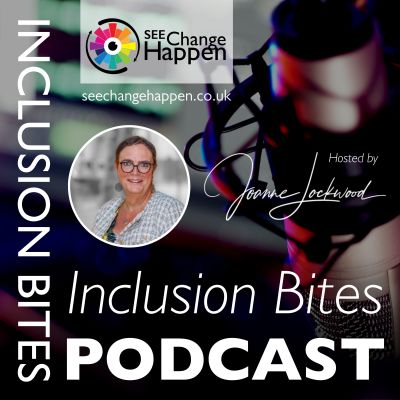Welcome to Inclusion Bites, where your host, Joanne Lockwood, dares to delve deep into the transformative world of Inclusive Cultures and Nurturing Belonging. Uncover the untold stories, challenges, and triumphs as Joanne engages with a dynamic roster of changemakers. Whether you're an HR aficionado, a Diversity & Inclusion champion, or someone who craves meaningful conversations that disrupt the status quo, this is the podcast for you. No room for surface-level chatter—strap in for conversations that not only inspire but also equip you with actionable insights. This isn't just another diversity podcast; this is a call to action. Unplug from the noise, tune into Inclusion Bites, and prepare to be enlightened, one bold conversation at a time. #InclusionBites ????✨
https://seechangehappen.co.uk/inclusion-bites-listen
episode 13: How to Simplify Inclusion by Focusing on Behaviours
How to Simplify Inclusion by Focusing on Behaviours
It was an interesting conversation with Jackie where we talked about how we can focus on the language used in our organisations over and above focusing on Unconscious Bias training as our only tool.
Jackie talks about her views on how organisations can develop their diversity and inclusion programmes by expanding on the baseline of unconscious bias training to look more intersectionally with a focus on the power imbalance and privileges that exist in the workplace. Jackie feel that that only by using a collaborate strategy that involves everyone and being proactive in our ally-ship is the only way we, as a society and our organisation can truly more a shift change in attitudes on inclusion. All to often diversity is focused on without looking at the underlying culture issues that need to be overcome first.
Published: 10.09.2020 Recorded: 31.07.2020 Duration: 0:42:28 Downloads: 59 Shownotes:Joanne sat down to talk to Jackie Handy about ‘How to Simplify Inclusion by Focusing on Behaviours’.
In order to become more inclusive we need to focus on the language that we use and behaviours that we demonstrate. Jackie has found when speaking to companies about their D&I strategies, the initial focus tends to be on unconscious bias and discrimination awareness training, which although she admits are a fundamental part of the D&I journey she feels this can put a negative spin on how employees feel about the topic. If someone’s first experience of Diversity and Inclusion is a training courses, it is often them being told that they are biased, and this can lead to them feeling extremely uncomfortable. It can make people feel defensive and ashamed, especially if they thought they were inclusive and affect engagement. Training should be used as part of an ongoing conversation around D&I, but not necessarily as an opening gambit, or in isolation, as this will affect the desired outcomes. It needs to be part of a holistic approach to imbed Diversity and Inclusion within the workplace. Jackie’s advice is to focus predominantly on proactive behavioural steps that can be taken, as this fosters a far more positive feeling.
Both Joanne and Jackie agree that it is no longer enough to say we are not racist; we now need to be both deliberate and proactive. It needs commitment from everyone to take small steps and look at how we can start the conversation. Jackie suggested companies having a ‘code of ethics’, encouraging people to start conversations in a non-threatening space so they feel able to share and learn from one another. We also need to educate ourselves on not only what it means to have privilege, but also to not. When facing a potentially uncomfortable, or challenging topic our first response can be defensive, something known as the fragility response, where we try to protect ourselves, but we need to try to understand why we respond this way in order to address the issue and move past it.
With any campaign or training an organisation undertakes they need to ensure that the message carries on beyond that, otherwise it will only have a tokenistic effect. We also need to be careful that we don’t discriminate a group just to benefit another – everyone has value and this needs to be appreciated. To achieve this Jackie promotes behaviour, because then you are ignoring all other expressions of our identity and focusing on the one thing that we have in common. We constantly say we do not like labels but continue to use them, but if we take the time to develop relationships and our identity within that relationship then we have a mutual platform we can build from. Inclusion boils down to a love of another human being, we all should take personal responsibility for being the one to make a difference. Jackie longs for the day that D&I is no longer a ‘thing’. We all have an innate need to feel as though we belong and that we are valued for who we are. If we can all start from a place of love, we could continue to develop our bonds and relationship with our fellow human beings, so it is imbedded within us.
Please connect with our hosts and guests, why not make contact..?Brought to you by your host Joanne Lockwood
SEE Change Happen
A huge thank you to our wonderful guest Jackie Handy
Runway Global
The post How to Simplify Inclusion by Focusing on Behaviours appeared first on SEE Change Happen: The Inclusive Culture Experts.
